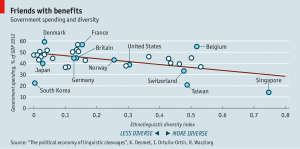“This is a really exciting area of research where game theory based models can provide direct insights into behavior of market participants.” — Roy
Rather than explicitly revealing information about the quality of their products and services, many firms prefer to signal quality through the prices they charge, typically working on the assumption that a high price indicates high quality.
New research by Maarten Janssen, University of Vienna, and Southern Methodist University economist Santanu Roy provides a new explanation for why firms choose not to disclose quality directly – and explains how prices that are set to signal quality can distort actual buying decisions.
Their study, “Competition, Disclosure and Signalling,” which is published in the February 2015 issue of the Economic Journal, shows that when firms compete on price, not disclosing product quality voluntarily can soften competition and boost profits.
“We often use prices to form ideas about product quality. Firms understand this,” said Roy, a professor in SMU’s Department of Economics in Dedman College of Humanities & Sciences. “As a result, their strategic decisions about pricing and direct disclosure of product characteristics become intricately linked. Our research explains why firms may prefer not to disclose quality attributes of their products and instead induce buyers to try to infer quality from prices: it allows firms to sustain high prices despite strong competition.”
Finding may be a case for imposing mandatory disclosure regulation
The finding has an important policy implication for regulators: even if consumers infer all relevant product information from prices (or other actions by firms), there may be a case for imposing mandatory disclosure regulation. Such regulation can reduce market power and the price and consumption distortions resulting from firms’ use of prices to signal product quality.
“If you regulate and force firms to directly disclose quality attributes, prices may fall and lead to better market outcomes,” Roy said. “This is a really exciting area of research where game theory based models can provide direct insights into behavior of market participants. Our current research studies some related issues such as the case for ‘truth in advertising’ regulation and penalizing false advertising of product attributes.”
The researchers begin by noting that in a large number of markets, ranging from educational and health services to consumer goods and financial assets, sellers have important information about the quality of their products. Quality attributes include satisfaction from consuming the product, durability, safety and potential health hazards as well as ethical and environmental attributes.
Information about these quality attributes is not always publicly available to potential buyers or competitors. In many of these markets, firms have the option of voluntarily disclosing product information in a credible and verifiable manner – for example, through independent certification, rating agencies or regulated advertising.
Without hard, credible information about products, buyers associate higher prices with better quality
But in practice, firms do not disclose product quality very often, even when there are relatively cost-effective mechanisms for credible disclosure and even when the product quality itself is not bad.
For example, empirical studies find that hospitals often do not disclose risk-adjusted mortality; schools often do not report standardized test scores; restaurants almost never disclose hygiene inspection reports; and so on.
In fact, the reluctance of firms to disclose voluntarily may discourage the emergence of rating agencies and certification intermediaries in many industries. This study provides a new explanation for why firms do not wish to disclose quality.
The researchers’ explanation is based on the commonplace observation that even when there is no hard and credible information about products on the market, buyers often associate higher prices with better quality and cheap products with low quality.
Such beliefs held by buyers are rational in markets where firms anticipate this and choose their actions (such as prices) to convey the hidden information. Economists call this “signaling”: it is an alternative way of communicating private information by firms.
The researchers argue that firms may not disclose product attributes voluntarily because they find it more profitable to signal their information indirectly.
Excessively high price makes it credible to buyers that product could not be low quality
This is somewhat paradoxical at first glance. Economists have long maintained that signalling is costly for firms. For example, to signal high quality through high prices, a firm may have to charge a much higher price than in a situation where product quality was observed or disclosed, leading to loss of sales and profit. The excessively high price is needed to make it credible to buyers that this could not be a low quality product as the producer of such a product would have lower costs and therefore prefer to sell high volume at low price.
Why then would a firm prefer to signal rather than disclose? The answer lies in the strategic behavior of firms and market competition. The researchers show that when firms compete on price, not disclosing product quality voluntarily, competing under a “veil of incomplete information” can soften competition, leading to higher profits and a more collusive outcome.
Firms’ incentives to lower prices to steal business from their rivals are disciplined by the fact that buyers may associate lower prices with lower quality. The resulting market outcome can be one with higher profits for the nondisclosing firm. The strategic incentive for nondisclosure may be strong even when a firm has a strong competitive advantage in the market.
Absence of voluntary disclosure does not mean that consumers make uninformed decisions
In contrast with previous research on this issue, the new explanation of nondisclosure is not based on disclosure being too costly or imperfect. The researchers show that no firm may disclose product quality (including the ones with the best product quality), even if the mechanism for voluntary disclosure is almost costless and frictionless.
The researchers’ analysis indicates that the absence of voluntary disclosure does not mean that consumers make uninformed decisions; nondisclosure arises precisely when buyers infer quality from the market behavior of firms.
But markets may well be inefficient as the prices that are set to signal quality distort actual buying decisions. This leads to the important policy implication that there may be a case for imposing mandatory disclosure regulation on firms. — Royal Economic Society and Southern Methodist University
Follow SMUResearch.com on twitter at @smuresearch.
SMU is a nationally ranked private university in Dallas founded 100 years ago. Today, SMU enrolls nearly 11,000 students who benefit from the academic opportunities and international reach of seven degree-granting schools. For more information see www.smu.edu.
SMU has an uplink facility located on campus for live TV, radio, or online interviews. To speak with an SMU expert or book an SMU guest in the studio, call SMU News & Communications at 214-768-7650.


 Women who are told men desire women with larger bodies are happier with their weight
Women who are told men desire women with larger bodies are happier with their weight Fossil supervolcano in Italian Alps may answer deep mysteries around active supervolcanoes
Fossil supervolcano in Italian Alps may answer deep mysteries around active supervolcanoes Study: Contraception may change how happy women are with their husbands
Study: Contraception may change how happy women are with their husbands Study funded by NIH is decoding blue light’s mysterious ability to alter body’s natural clock
Study funded by NIH is decoding blue light’s mysterious ability to alter body’s natural clock Jurassic climate of large swath of western U.S. was more complex than previously known
Jurassic climate of large swath of western U.S. was more complex than previously known Asthma patients reduce symptoms, improve lung function with shallow breaths, more CO2
Asthma patients reduce symptoms, improve lung function with shallow breaths, more CO2 Hunt begins for elusive neutrino particle at one of the world’s largest, most powerful detectors
Hunt begins for elusive neutrino particle at one of the world’s largest, most powerful detectors Study will teach algebra with student-authored stories that draw on their own interests
Study will teach algebra with student-authored stories that draw on their own interests Key to speed? Elite sprinters are unlike other athletes — deliver forceful punch to ground
Key to speed? Elite sprinters are unlike other athletes — deliver forceful punch to ground Hunt for dark matter takes physicists deep below earth’s surface, where WIMPS can’t hide
Hunt for dark matter takes physicists deep below earth’s surface, where WIMPS can’t hide Marital tension between mom and dad can harm each parent’s bond with child, study finds
Marital tension between mom and dad can harm each parent’s bond with child, study finds



 Department of Defense awards $2.6 million to SMU STEM program for minority students
Department of Defense awards $2.6 million to SMU STEM program for minority students
 Observed by Texas telescope: Light from huge explosion 12 billion years ago reaches Earth
Observed by Texas telescope: Light from huge explosion 12 billion years ago reaches Earth



 Sweden, SMU psychologists partner to launch parenting program that reduces child abuse
Sweden, SMU psychologists partner to launch parenting program that reduces child abuse Chemical probe confirms that body makes its own rotten egg gas, H2S, to benefit health
Chemical probe confirms that body makes its own rotten egg gas, H2S, to benefit health Study: High-volume Bitcoin exchanges less likely to fail, but more likely to suffer breach
Study: High-volume Bitcoin exchanges less likely to fail, but more likely to suffer breach Musicians who learn a new melody demonstrate enhanced skill after a night’s sleep
Musicians who learn a new melody demonstrate enhanced skill after a night’s sleep Study finds that newlyweds who are satisfied with marriage are more likely to gain weight
Study finds that newlyweds who are satisfied with marriage are more likely to gain weight Fruit flies fed organic diets are healthier than flies fed nonorganic diets, study finds
Fruit flies fed organic diets are healthier than flies fed nonorganic diets, study finds Center for Creative Leadership to study innovative learning method of SMU Lyle School of Engineering
Center for Creative Leadership to study innovative learning method of SMU Lyle School of Engineering NOvA neutrino detector in Minnesota records first 3-D particle tracks in search to understand universe
NOvA neutrino detector in Minnesota records first 3-D particle tracks in search to understand universe

 Parenting program tackles child abuse and neglect among formerly homeless families
Parenting program tackles child abuse and neglect among formerly homeless families Hiding in plain sight: How invisibility saved New Mexico’s Jicarilla Apache
Hiding in plain sight: How invisibility saved New Mexico’s Jicarilla Apache Study: Most Texas ISDs that are teaching the Bible are skirting 2007 state law
Study: Most Texas ISDs that are teaching the Bible are skirting 2007 state law Study finds Jurassic ecosystems were similar to modern: Animals flourish among lush plants
Study finds Jurassic ecosystems were similar to modern: Animals flourish among lush plants SMU contributes fossils, expertise to new Perot Museum in ongoing scientific collaboration
SMU contributes fossils, expertise to new Perot Museum in ongoing scientific collaboration 100 million-year-old coelacanth discovered in Texas is new fish species from Cretaceous
100 million-year-old coelacanth discovered in Texas is new fish species from Cretaceous Academic achievement improved among students active in structured after-school programs
Academic achievement improved among students active in structured after-school programs Texas frontier scientists who uncovered state’s fossil history had role in epic Bone Wars
Texas frontier scientists who uncovered state’s fossil history had role in epic Bone Wars Observed! SMU’s LHC physicists confirm new particle; Higgs ‘God particle’ opens new frontier of exploration
Observed! SMU’s LHC physicists confirm new particle; Higgs ‘God particle’ opens new frontier of exploration